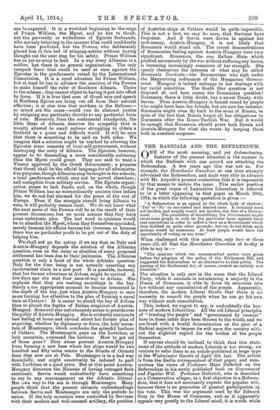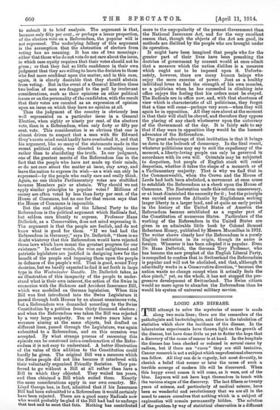THE RADICALS AND THE REFERENDUM.
ONE of the most amusing, and yet disheartening, features of the present situation is the manner in which the Radicals with one accord are attacking the Referendum. A few years ago this was not so. For example, the Manchester Guardian at one time strongly advocated the Referendum, and dealt very ably in advance with Mr. Asquith's present contention that it is impossible by that means to isolate the issue. This earlier position of the great organ of Lancashire Liberalism is referred to in a letter appearing in that paper on March 28th, 1914, in which the following quotation is given :— " A Referendtun is an appeal to the whole body of electors: 'Tee' or 'No' on one stated and limited issue. It certainly need not involve, and usually would not involve, the fate of a Govern- ment. . . . The possibility of discrediting the Government might cause some people to vote on the particular issue against their real convictions in order to inflict a blow on a Government which they disliked on quite other grounds ; but we do not think such persons would be numerous. At least people would have the Opportunity of voting on one issue."
When challenged with this quotation, only two or three years old, all that the Manchester Guardian of to-day is able to say is :—
" The opinions which our correspondent quotes were given before the adoption of the policy of the Parliament Bill, and suggested the Referendum as an alternative to that policy. The passing of the Parliament Act, of course, created an entirely new situation."
The situation is only new in the sense that the Liberal Party, while it succeeds in maintaining a majority in the
House of Commons, is able to force its measures into Ian' without any consultation of the people. Apparently, therefore, the modern Liberal thinks that there is no necessity to consult the people when he can go his own way without such consultation.
This, indeed, we regret to say, is undoubtedly the key- note of modern Liberalism. All the old Liberal principles of "trusting the people" and "government by consent" have in these latter days been thrown to the winds, and we are faced with a brutal determination on the part of a Radical majority to impose its will upon the country with- out the slightest regard for the wishes of the people themselves.
If anyone should be inclined to think that this state- ment of the attitude of modern Liberals is too strong, we venture to refer them to an article published in large type in the Westminster Gazette of April 6th last. The article is from the Berlin correspondent of that paper, and sum- marizes the views of Professor Hans Delbriick on the Referendum in his newly published book on Government and Popular Will. Professor Delbrtick, who is described as a Conservative, alleges, as a first objection to &Referen- dum, that it does not necessarily express the popular will, because there is no guarantee of general participation in the vote. This was the argument used by Sir Edward Grey in the House of Commons, and, as it apparently appeals very greatly to the Liberal mind, it is worth while
to submit it to brief analysis. The argument is that, because only fifty per cent., or perhaps a lesser proportion, of the electors vote on a Referendum, the popular will is not expressed. The underlying fallacy of this argument is the assumption that the abstention of electors from voting has no meaning. It has one of two meanings : either that those who do not vote do not care about the issue, in which case equity requires that their votes should not be given ; or that they feel so little confidence in their own judgment that they are willing to leave the decision to those who feel more confident upon the matter, and in this case, again, it is clearly desirable that they should abstain from voting. But in the event of a General Election these two bodies of men are dragged to the poll by irrelevant considerations, such as their opinions on other political issues or on the personality of the candidates, with the result that their votes are counted as an expression of opinion upon an issue on which they have no opinion at alL Thus the judgment of the country is obviously less well represented on a particular issue in a General Election, when eighty or ninety per cent, of the electors vote, than in a Referendum, when only forty or fifty per cent. vote. This consideration is so obvious that one is almost driven to suspect that a man with Sir Edward Grey's acute mind could hardly have overlooked it, and that his argument, like so many of the statements made in the recent political crisis, was directed to confusing issues rather than to elucidating the truth. In our judgment, one of the greatest merits of the Referendum lies in the fact that the people who have not made up their minds, or do not care about the matter at issue, stay away, and leave the nation to express its wish—as a wish can only be expressed—by the people who really care and really think. Again, no one thinks Parliamentary votes are stultified because Members pair or abstain. Why should we not apply similar principles to popular votes ? Millions of money are often voted by less than forty per cent, of the House of Commons, but no one for that reason says that the House of Commons is impossible.
But the real objection of the Liberal Party to the Referendum is the political argument which Radicals feel, but seldom care bluntly to express. Professor Hans Delbriick, as a Conservative, does not mind expressing it. The argument is that the people are foolish, and do not know what is good for them. "If we had had the Referendum in Germany," says Dr. Delbrfick, "there is no doubt whatever that this Referendum would have rejected those laws which have meant the greatest progress for our existence." In other words, the wise and enlightened and patriotic legislators are justified in designing laws for the benefit of the people and imposing them upon the people in defiance of the people's will. That is good, sound Tory doctrine, but we hardly expected to find it set forth in large type in the Westminster Gazette. Dr. Delbrfick takes, as an illustration of this incapacity of the people to under- stand what is their own interest, the action of the Swiss in connexion with the Sickness and Accident Insurance Bill, which was modelled on German legislation. When this Bill was first introduced into the Swiss Legislature it passed through both Houses by an almost unanimous vote, but a Referendum was demanded according to the Swiss Constitution by a petition from thirty thousand electors ; and when the Referendum was taken the Bill was rejected by a very large majority. Ten or twelve years later a measure aiming at the same objects, but drafted on different lines, passed through the Legislature, was again submitted to a Referendum, and on this occasion was accepted. By what strange process of reasoning this episode can be construed into a condemnation of the Refer- endum it is not easy to understand. A better illustration of the value of this addition to the Constitution could hardly be given. The original Bill was a measure which the Swiss people did not like because it interfered with their voluntarily organized Friendly Societies. They pre- ferred to go without a Bill at all rather than have a Bill to which they objected. They waited ten years, and then obtained a Bill which suited them. Exactly the same considerations apply in our own country. Mr. Lloyd George has, in fact, admitted that if his Insurance Bill had been submitted tea Referendum it would certainly have been rejected. There are a good many Radicals now who would probably be glad if the Bill had had to undergo that test and to meet that fate. Nothing has contributed more to the unpopularity of the present Government than the National Insurance Act, and for the very excellent reason that, though the objects of the Act are good, its methods are disliked by the people who are brought under its operation.
It might have been imagined that people who for the greater part of their lives have been preaching the doctrine of government by consent would at once admit that a measure which the nation dislikes is a measure which ought not to be imposed upon it. Unfortu- nately, however, there are many human beings who enjoy the mere exercise of power. Just as a healthy individual loves to feel the strength of his own muscles, so a politician when he has succeeded in climbing into office enjoys the feeling that his orders must be obeyed. The Radicals are in office now, and, with that shortness of view which is characteristic of all politicians, they forget that a time will come—perhaps very soon—when they will again be in opposition. All they care about at the moment is that their will shall be obeyed, and therefore they oppose the placing of any check whatsoever upon the autocracy of the Government of the day. It is fairly safe to say that if they were in opposition they would be the keenest advocates of the Referendum.
The great advantage of that institution is that it brings us down to the bedrock of democracy. In the final resort, whatever politicians may say to suit the expediency of the moment, a liberty-loving people can only be governed in accordance with its own will. Orientals may be subjected to despotism, but people of English stock will resist despotism, whether it takes the shape of a monarch or of a Parliamentary majority. That is why we find that in the Commonwealth, when the Crown and the House of Lords bad both been abolished, a movement at once arose to establish the Referendum as a check upon the House of Commons. The Restoration made this reform unnecessary, or at least diminished the necessity for it ; but the principle was carried across the Atlantic by Englishmen seeking larger liberty in a larger land, and at quite an early period in the history of the United States of America the Referendum became established as a regular part of the Constitution of numerous States. Particulars of the working of the Referendum in the 'United States are given in an admirable little book by Colonel Samuel Robertson Honey, published by Messrs. Macmillan in 1912. The writer shows clearly how the Referendum is a purely English institution in its origin, though its name is foreign. Wherever it has been adopted it is popular. Even Dr. Hans Delbrtick, the German Tory Professor, who has become the new prophet of the English Liberal Party, is compelled to confess that in Switzerland the Referendum is popular and will not be abolished, and that, although it admittedly works in a Conservative direction," because the nation wants no change except when it actually feels the shoe pinch," yet, on the whole, it has not stopped the pro- gressive development of Switzerland. The Swiss citizen would no more agree to abandon the Referendum than he would his system of universal military service.







































 Previous page
Previous page